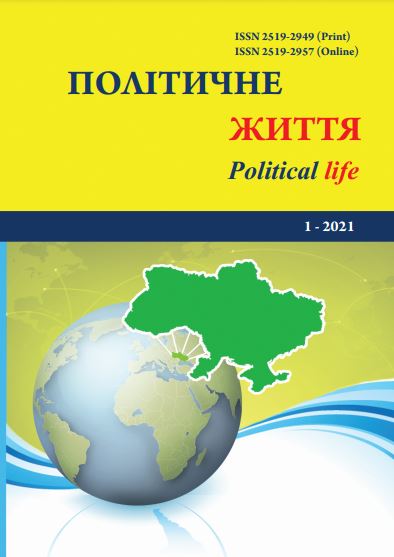The causes and origins of separatism in Jammu and Kashmir
DOI:
https://doi.org/10.31558/2519-2949.2021.1.7Keywords:
Jammu and Kashmir; India; Pakistan; China; SeparatismAbstract
Indian society is distinguished by an extraordinary diversity of ethnic, confessional, caste and social. Ethnic groups inhabiting the country are different in size, levels of economic development and national identity, degree of consolidation and autonomy. In addition, the ethnic situation in India is complicated by the religious factor. Approximately 85% of the population of India belongs to the Hindu community, the rest are minority communities (Muslims, Christians of various denominations, Sikhs, Buddhists, Jains). In addition, as a political unity, modern India was created artificially, as a result of the British conquest. Therefore, the national feeling arose after the fact, and not in the natural process of the national consolidation of the country.
It is not surprising that due to this heterogeneity of the population, India over the years of independence has faced many conflict situations caused by dissatisfaction with its position on the part of various ethnic, social and religious groups, as well as contradictions between their interests. Such protests of minorities, as well as conflicts on ethnic and religious grounds, always pose a threat to political stability, and sometimes – to the territorial integrity of the country. In this regard, movements pursuing separatist goals pose a particular danger to the unity of the Indian state. Some of them (for example, the movement for the creation of an independent "Dravidistan" in southern India) were allowed within the federal system through the creation of the so-called "linguistic states" after the territorial reorganization in 1956. But even now, separatist movements continue in different parts of India. of varying intensity. The central and regional authorities of the country are making great efforts in the fight against separatism. To do this, they use the entire available arsenal of means and methods: from options for suppressing separatists by military force to peace negotiations and considering the possibility of a political settlement of the problem.
References
Jammu Kashmir Article 370: Govt revokes Article 370 from Jammu and Kashmir, bifurcates state into two Union Territories (англ.). The Times of India (5 August 2019).
Kuprijanov A. Smena statusa: pochemu Dzhammu i Kashmir perestal byt' shtatom. URL: https://iz.ru/906977/aleksei-kupriianov/smena-statusa-pochemu-dzhammu-i-kashmir-perestal-byt-shtatom
Treaty between the British Government and Maharaja Gulab Singh ofJummoo. in: Drew F. Land Marks in Indian Anthropology. Jammu & Kashmir Territories. An Account. Vol.26. New Delhi, 1987.
D'yakov A. M. Nacional'nyj vopros v sovremennoj Indii. M., 1963.
Antonova A.K., Bongard-Levin G.M., Kotovskij G.G.. Istoriya Indii. M., 1979.
Novejshaya istoriya Indii / Otv. red. V.V.Balabushevich, A.M.D'yakov. M., 1959.
Diurozel Zh.-B. Istoriia dyplomatii vid 1919 r. do nashykh dniv. K., 1995.
Sebastian P.A. Kashmir behind the Propaganda Curtain. Economic and Political Weekly, 10.02.1996.
Alastair Lamb. Crisis in Kashmir. 1947to 1966. London, 1966. P.66-67.
Borovoj Ya. O bednom Kashmire zamolvite slovo. Novoe vremya. 1992. № 43. С. 25.
Indian Complaint to the Security Council. Letter Dated 1 January, 1948, from the Representative of India to the President of the Security Council (S/628) URL: http://www. atlas,uk/indiaforum/kashmir/history/requests.htm
Resolution 39 (1948) Submitted by the Representative of Belgium and Adopted by the Security Council at its 230th Meeting Held on 20 January 1948. (Document No. S/654 Dated the 20th January 1948) URL: http://www.alumni.caltech.edU/~mughal/kashmir/undoc/2.html
Resolution 47 (1948) on the India-Pakistan Question Submitted Jointly by the Representatives of Belgium, Canada, China, Columbia, the United Kingdom and the United States of America and Adopted by the Security Council at its 286th Meeting Held on 21 April1948. (Document No. S/726 Dated the 21st April 1948) URL: http://www.alumni.caltech.edu/~mughal/kashmir/undoc/3Mml
Resolution Adoptedby the United Nations Commission for India and Pakistan on 13 August 1948. (Document No. S/1100, para 75, Dated the 9th November 1948) URL: http://www.alurnni.caltech.edu/' ~mughal/kashmir/undoc/5.html
Resolution Adopted at the Meeting of the United Nations Commission for India and Pakistan on 5 January, 1949. (Document No. 5/1196, para 15, Dated the 10th January, 1949) URL: http://www.mtholyoke.edu/acad/intrel/uncom2.htm
Resolution 80 (1950) Concerning the India-Pakistan Question Submitted by the Representatives of Cuba, Norway, the United Kingdom and the United States of America and Adopted by the Security Council on March 14, 1950. (Document No. S/1469, Dated the 14h March, 1950) URL: http://www.mtholyoke.edu/acad/intrel/lcashun80.htm
Resolution 91 (1951) Concerning the India-Pakistan Question Submitted by the Representatives of the United Kingdom and the United States of America and Adopted by the Security Council on March 30, 1951. (Document No. S/2017/Rev. 1, Dated the 30h March, 1951) URL: http://www.mtholyoke.edu/acad/intrel/kashun91.htm
Resolution 96(1951) Concerning the India-Pakistan Question Adopted by the Security Council on the 10h November, 1951. (Document No. 5/2392, Dated the 10h November, 1951) URL: http://www. mtholyoke.edu/acad/intrel/kashun96.html

